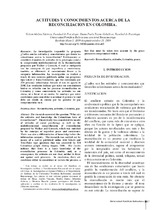| dc.contributor.author | Molina Valencia, Nelson | |
| dc.contributor.author | Triana Caballero, Diana Paola | |
| dc.coverage.spatial | Seccional Bucaramanga | spa |
| dc.date.accessioned | 2021-02-15T16:51:33Z | |
| dc.date.available | 2021-02-15T16:51:33Z | |
| dc.date.issued | 2009 | |
| dc.identifier.uri | http://hdl.handle.net/20.500.11912/8065 | |
| dc.description | 12 p. | spa |
| dc.description.abstract | La investigación respondió la pregunta ¿Cuáles son las actitudes y conocimientos que tienen los colombianos acerca la reconciliación? Teóricamente se consideró el modelo de actitudes de la psicología social y la comprensión multidimensional de la Reconciliación propuesta por Walker y Gorsuch, el cual se enriqueció con los conceptos de paz imperfecta y convivencia; también se diferenció el conocimiento frente a la categoría información. La investigación se realizó a través de una encuesta publicada online con preguntas tipo Likert y Falso-Verdadero, que fue contestada por 320 personas colombianas durante el mes de agosto de 2008. Los resultados indican que existe un conocimiento básico en relación con los procesos reconciliación en Colombia y como consecuencia las actitudes no son claras, ni a favor ni en contra. Se concluye que existe condiciones para consolidar o arruinar el proceso lo cual debe ser tenido en cuenta por los gestores de paz comprometidos en él. | spa |
| dc.description.abstract | The research answered the question “What are the attitudes and knowledge the Colombians have of reconciliation?” Theoretically was considered the model of attitudes of social psychology as well as the multidimensional comprehension of reconciliation proposed by Walker and Gorsuch, which was enriched by the concepts of imperfect peace and coexistence. There was also a differentiation of knowledge before the information category. The research was carried out by means of a survey published online with Likert and True-False type questions that was answered by 320 Colombian people during August, 2008. The results indicate that there is a basic knowledge of the reconciliation processes in Colombia and, as a consequence, the attitudes are not clear, neither in favor nor against such processes. In conclusion, there are conditions either to consolidate or to ruin the process; a fact that must be taken into account by the peace promoters compromised with it. | spa |
| dc.format.mimetype | application/pdf | |
| dc.language.iso | spa | |
| dc.publisher | UPB | spa |
| dc.relation.ispartof | Puente. Revista Científica | spa |
| dc.rights | Attribution-NonCommercial-NoDerivatives 4.0 International | * |
| dc.rights.uri | http://creativecommons.org/licenses/by-nc-nd/4.0/ | * |
| dc.subject | Reconciliación | spa |
| dc.subject | actitudes | spa |
| dc.subject | Colombia | spa |
| dc.subject | paz | spa |
| dc.subject | peace | spa |
| dc.title | Actitudes y conocimientos acerca de la reconciliación en Colombia | spa |
| dc.type | article | spa |
| dc.rights.accessRights | openAccess | spa |
| dc.type.hasVersion | publishedVersion | spa |
| dc.description.sectional | Bucaramanga | spa |
| dc.identifier.instname | instname:Universidad Pontificia Bolivariana | spa |
| dc.identifier.reponame | reponame:Repositorio Institucional de la Universidad Pontificia Bolivariana | spa |
| dc.identifier.repourl | repourl:https://repository.unab.edu.co/ | |


